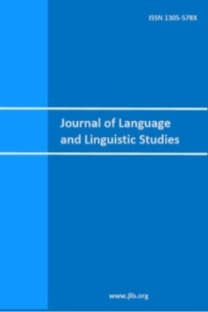Is it really difficult to produce correct th (/ð / and /θ/) sounds in English for EFL Learners? A case study in Northern Cyprus.
Pronunciation problems, EFL learners
___
Alkhuli, M. A. (1983). English as a foreign language. PhD Dissertation, King Abdul Aziz Public Library. Bayraktaroğlu, S. (2008). Orthographic interference and the teaching of British. pronunciation to Turkish. Learners Journal of Language and Linguistic Studies, 4(2), 19. Bekleyen, N. (2011). Pronunciation problems of the Turkish EFL learners. Electronic Journal of Social Sciences, 10(36), 094-107. Demirezen, M., 2007. A model to rehabilitate a fossilized pronunciation error of Turkish English language Teachers: The English consonant phoneme /ŋ/ wrongly articulated as /nk/ through nasal devoicing. Journal of Language and Linguistic Studies, 3(2), pp. 289-303. Hişmanoğlu, M. (2007) [ɔː] and [oʊ] contrast as fossilized pronunciation error of Turkish learners of English and solutions to the problem. Journal of Language and Linguistic Studies, 3(1), 99-115. Karakaş & Sönmez (2011). The teaching of [θ] and [ð] sounds in English. 1st International conference on foreign language teaching and applied linguistics, May 5-7, 2011, Sarajeva. Kenworthy, J. (1987). Teaching English pronunciation. London: Longman. Şenel, M. (2006). Suggestions for beautifying the pronunciation of EFL learners in Turkey. Journal of language and linguistic studies, 2(1), 111-125. O’Connor & Fletcher. (1989). Sounds English, A pronunciation practice book. London: Longman. O’Connor, J. D. (1980). Better English pronunciation (2nd edition). Cambridge: Cambridge University Press. Fletcher Ohata, K. (2004). Phonological differences between Japanese and English: Several potentially problematic areas of pronunciation for Japanese ESL/EFL learners. Asian EFL Journal, 6(4), article 5.- ISSN: 1305-578X
- Yayın Aralığı: Yılda 4 Sayı
- Yayıncı: Hacettepe Üniversitesi
A qualitative inquiry into the application of 9th grade EFL program in terms of the CEFR
Erkan YÜCE, İsmail Hakkı MİRİCİ
Dealing with in-class challenges: Pre-service teacher cognitions and influences
Şeyda Selen ÇİMEN, Ayşegül DALOĞLU
Validity and reliability study of the attitude scale towards second foreign language learning
Şaban ÇETİN, Yusuf BUDAK, Filiz ÇETİN, A. Selcen ARSLANGİLAY
Learning while teaching: Student teachers’ reflections on their teaching practicum
Student teachers’ attitudes towards the compulsory English courses at the Turkish universities
Evaluating the effect of writing instructions on students' writing skills
An investigation of pre-service English teachers’ level of technopedagogical content knowledge
